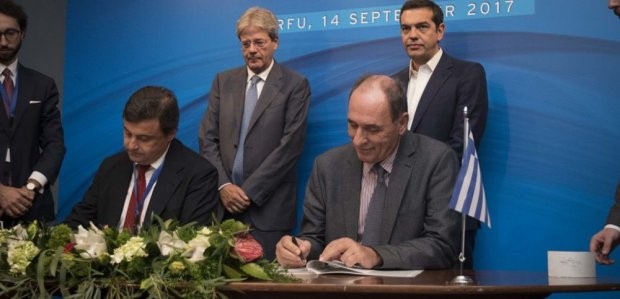[Premium] GreekStream Resurfaces but no Clear Endgame
Russian plans to extend TurkStream beyond Turkey and into Greece – competing with gas supplies from the Caspian region – remain on the agenda, with support from southern Europe.
Gazprom's original pipeline route South Stream would have competed with Nabucco or whichever alternative route was selected to deliver Shah Deniz gas to the Balkans; that earlier plan entailed a direct line from Russia to Bulgaria, also on the 'Nabucco' route.
With that scheme thwarted by the European Commission on grounds that Bulgaria had not correctly tendered for goods and services, the line was forced southwards to a Turkish landfall. But since then there has not been much movement on a second line, to carry gas into countries which now receive Russian gas by way of Ukraine.
With practically all Russian gas transit through Ukraine due to end 2019 when the contract expires, Gazprom needs to secure alternative routes into southern Europe. But this brings it into conflict with shippers of Azeri gas through the officially-recognised Southern Gas Corridor, a joint EU and US plan to reduce EU dependence on Russian gas. However it does have the tacit support from Italy and Greece, and also France.
The Greek-Italian Co-operation Council held its ‘first bilateral intergovernmental conference’ in Corfu, which was concluded with a joint declaration, signed by the two energy ministers, Giorgos Stathakis and Carlo Calenda. The September 14 meeting was also attended by the two prime ministers, Alexis Tsipras and Paolo Gentiloni.
The signing ceremony

Calenda (L) and Stathakis (Source: Energypress)
The declaration made a specific reference to the ‘development of a new diversified route for the transport of Russian gas through the IGI Poseidon pipeline and the extensions of the gas transmission systems of Greece and Italy, dubbed by the Greeks as the ‘Greek Stream’.
The declaration also included commitments to strengthen energy co-operation between Greece and Italy to create a strong energy hub in the Mediterranean and connection of the two national power grids. The common objective is to ensure that end-users in the two countries have access to affordable and sustainable energy.
TurkStream route
.jpg)
(Credit: Gazprom)
Italy has been promoting IGI Poseidon intensively over the last few months as it sees it as vital for its energy efficiency. The case has been made in Brussels, Washington, Moscow and Athens.
The argument made repeatedly by Italy to the European Commission and others is that TurkStream and IGI Poseidon will not increase Russian gas presence in Europe. Its purpose is simply to replace the Russian gas route to Italy from the north with a more economical southern route.
The need for economical, secure, gas supplies in the longer term is identified in Italy’s national energy strategy to 2030, covered in Natural Gas World in July.
Eni and Edison have been in discussions with Russian exporter Gazprom about the possibility of importing gas from a southern route, as an extension of TurkStream. In fact, Eni concluded last March a memorandum of understanding with Gazprom for the supply of Russian gas through the southern route. Calenda also confirmed that Italy and Russia are working closely together on energy security.
This was further confirmed by the Russian energy minister, Alexander Novak, in August. He said that Russia is ready to supply gas through the TurkStream pipeline to Greece and Bulgaria. He added: "We are constantly discussing these issues with countries interested in receiving Russian gas such as Greece and Italy. Bulgaria is now again part of the initiative to make supplies through its territory." In fact, Bulgaria confirmed its readiness to receive gas from TurkStream in July. Hungary also signed an accord with Gazprom in July to link into TurkStream.
In addition, last June the CEOs of Gazprom Alexei Miller, Edison, Marc Benayoun, and Greek gas importer Depa, Theodoros Kitsakos, signed a co-operation agreement at the St Petersburg International Economic Forum in the presence of Calenda and George Tsipras, the secretary-general for international economic relations at the Greek foreign ministry. Interestingly, Kitsakos is also chairman of IGI Poseidon.
The agreement envisages undertaking joint efforts to establish a southern route for Russian gas supplies to Europe, through Turkey, Greece and Italy. The companies agreed to co-ordinate the development of a pipeline project, including IGI Poseidon, from the Turkey/Greece border to Italy. It states that this will be done in full compliance with relevant applicable legislative frameworks.
Italy hopes that natural gas will be provided by TurkStream, extending through Greece, and IGI Poseidon. Italian officials have often made the case in Brussels as well as in Washington – both are watching these developments with interest.
In addition to the recent sanctions, the US is still applying pressure to avoid this project. The European view, though, is that the new US sanctions may make it harder for Russia to build gas export pipelines to Europe but it is unlikely to stop them.
But Gazprom is taking steps to reduce the impact of sanctions. Reuters reported late June that the construction of the second TurkStream pipeline is underway just in case the sanctions hit it. Allseas confirmed that it is working on the second line while Gazprom was keen to downplay it, saying it was just the shallow water part that was being laid.
Last June Miller said: “Both lines go to Turkey. The gas pipeline will run along a route from Anapa in Russia, from the Russkaya compressor station, to Kiyikoy in Turkey. From there, one line will be for the Turkish market alone; this is 15.75bn m³. The other line is intended for countries in south and southeast Europe. At present there are proposals on pipe-laying routes. There is no exclusivity. Preliminary agreements with interested companies have been signed, therefore the work will continue… Demand for gas in this region is growing and TurkStream will ensure reliable gas supplies to these countries.”
It all looks like a game of chess with intriguing moves but no end-game in sight yet.
Charles Ellinas



